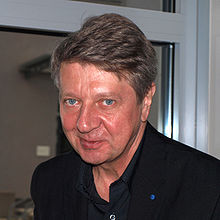Krzysztof Matyjaszewski, Polish-American chemist; J.C. Warner Professor of the Natural Sciences at the Carnegie Mellon University ; discoverer of atom transfer radical polymerization (ATRP), a novel method of polymer synthesis that has revolutionized the way macromolecules are made.

Born: Born: April 8, 1950, Konstantynów Łódzki, Poland
Early days. During 1963-1967 he went to the liceum (high school) in Zelow. He began his MS studies at the Chemical Engineering Department of Lodz Polytechnic, Lodz, Polamd. After getting a stipend he went to the Petrochemical Institute in Moscow, Soviet Union, where he finished his studies in 1973. After returning to Poland he started working at the Center of Molecular and Macromolecular Studies of PAN (CBMiM PAN), where in 1976 he got a doctorate for the work Makroestry, pary jonowe i wolne jony w polimeryzacji tetrahydrofuranu and completed a postdoctoral fellowship at the University of Florida in 1977. From 1978 to 1984, he was a research associate of the Polish Academy of Sciences and in 1985 he got habilitation at the Technical University of Lodz, Poland.
Career. From 1984 to 1985, Matyjaszewski held appointments at the University of Paris, first as a research associate and then as a visiting professor. In 1985, he joined the chemistry department at Carnegie Mellon. In 1998 he founded and currently directs the university's Center for Macromolecular Engineering. This Center is funded both by an active consortium and government agencies, including the National Science Foundation.. From 1994 to 1998, Matyjaszewski served as head of the Department of Chemistry at Carnegie Mellon and assisted in recruiting additional faculty with strengths in polymer chemistry. At the same time, he formed a research consortium with various industrial corporations to expand the understanding of controlled radical polymerization, including ATRP, and accelerate the transfer of this technology to different commercial applications. In 1998, Matyjaszewski was appointed the J.C. Warner Professor of Natural Sciences. A second consortium, the CRP Consortium, formed under his leadership in 2001, continues and expands his research efforts, training university and industrial scientists in procedures for responsive polymeric material development. In 2004 he was named a University Professor, the highest distinction faculty can achieve at Carnegie Mellon. Matyjaszewski is also an adjunct professor in Carnegie Mellon's department of materials science and engineering. Krzysztof Matyjaszewski is an internationally recognized polymer chemist. He is perhaps best known for the discovery of atom transfer radical polymerization (ATRP), a novel method of polymer synthesis that has dramatically changed the way such molecules are made. Matyjaszewski is a co-inventor on 51 issued U.S. patented technologies, holds 143 international patents and has 36 active U.S. patent applications. One of the leading educators in the field of polymer chemistry, Matyjaszewski has 14 current doctoral students and 5 postdoctoral fellows. He has mentored more than 200 undergraduate, graduate and postdoctoral students since joining Carnegie Mellon. He has authored 17 books, 83 book chapters and more than 870 peer-reviewed scientific papers. His work has been cited in the scientific literature more than 68,000 times, making him one of the most cited chemists in the world.
Awards. 1974 Award of the Scientific Secretary of the Polish Academy of Sciences; National Institute for Materials Science (Japan) Award; 1980 Award of the Polish Chemical Society; 1981 Award of the Polish Academy of Sciences; 1989 Presidential Young Investigator Award, National Science Foundation; 1995 Carl S. Marvel Creative Polymer Chemistry Award, American Chemical Society; 1998 Elf Chair of the French Academy of Sciences; 1999 Humboldt Award for Senior Scientists; 2001 Fellow, Polymeric Materials Science and Engineering Fellow, American Chemical Society; Pittsburgh Award, American Chemical Society; 2002 Polymer Chemistry Award, American Chemical Society; 2004 Cooperative Research Award, American Chemical Society; Prize of the Foundation for Polish Science; 2005 Chair, Gordon Research Conference, Polymer East; Foreign Member, Polish Academy of Sciences; Macro Group Medal, Royal Society of Chemistry; 2006 Member, National Academy of Engineering; 2007 Herman Mark Senior Scholar Award, American Chemical Society; 2009 Presidential Green Chemistry Challenge Award; 2010 Fellow, American Chemical Society Polymer Chemistry Division; Gutenberg Award, University of Mainz; 2011 Fellow, American Chemical Society; Carnegie Science Award for Excellence, Advanced Materials; Japanese Society Polymer Science Award; Wolf Prize in Chemistry, with Stuart Alan Rice of the University of Chicago and Ching W. Tang of theUniversity of Rochester; 2012 Dannie-Heineman Prize, Göttingen Academy of Sciences; Société Chimique de France Prize; Maria Sklodowska-Curie Medal, Polish Chemical Society; 2013 Madison Marshall Award, American Chemical Society, Alabama Section; 3 Inaugural Akzo Nobel North America Science Award, American Chemical Society; 2014 Fellow, National Academy of Inventors.
Honorary degrees. 2002 – University of Ghent, Belgium; 2006 – Russian Academy of Sciences; 2007 – Technical University of Lodz, Poland; 2008 – University of Athens, Greece; 2010 – l'Institut Polytechnique, Toulouse, France; 2013 - Pusan National University, Pusan, South Korea; 2013 - Universite P. & M. Curie, Sorbonne, Paris, France; He is also a honorary member of the Chinese Chemical Society and Israel Chemical Society.
This article uses, among others, material from the Wikipedia article "Krzysztof Matyjaszewski".Text is available under the Creative Commons Attribution-ShareAlike License; additional terms may apply. :
Wikipedia
Other sources include:
Wikipedia in Polish
Published on 5/17/2015
Return to home page:
Prominent Poles
